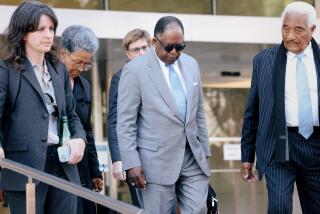Jury Deadlock Ends Trial of Downey Councilman
- Share via
The misdemeanor conflict-of-interest trial of Downey Councilman James S. Santangelo ended in a mistrial Tuesday after the jury deadlocked 11-1 in favor of conviction.
Downey Municipal Judge Robert G. Drees declared a mistrial after foreman William Melvin of Long Beach said the jury was deadlocked after deliberating for 1 1/2 days.
Santangelo, 53, was charged with having a conflict of interest when he voted in July, 1984, to expand the city’s redevelopment district. Santangelo owned land in the original district and in the expansion area.
The holdout juror, who asked that he not be identified, said he was not convinced Santangelo stood to benefit from the expansion any more than the general public, a requirement for conviction.
“He (the holdout) recognized there was no question in my mind that I didn’t do it for myself. I did it for the community,” Santangelo said outside court. Santangelo was elected in June, 1984.
New Trial ‘Probable’
Deputy Dist. Atty. Herbert Lapin said prosecutors have until March 7 to decide whether Santangelo will be retried. “At 11 to 1, I think we’re probably obligated to retry it,” he said. During the trial, Lapin portrayed Santangelo as a calculating businessman who won his council seat and immediately voted for the expansion to benefit his property holdings.
Defense attorney Leo B. Newton argued that the mere formation of a redevelopment district without approval of specific projects does not create wealth, or the basis for a conflict of interest. Even if there was a conflict of interest, Newton said, Santangelo did not knowingly vote for his own benefit.
The expansion district was invalidated in 1985 by a Superior Court judge who found that Santangelo had a conflict of interest. That decision was upheld by the California 2nd District Court of Appeal.
If convicted, Santangelo would have faced up to six months in jail, a $10,000 fine and could have been barred from public office for four years.
More to Read
Sign up for Essential California
The most important California stories and recommendations in your inbox every morning.
You may occasionally receive promotional content from the Los Angeles Times.










